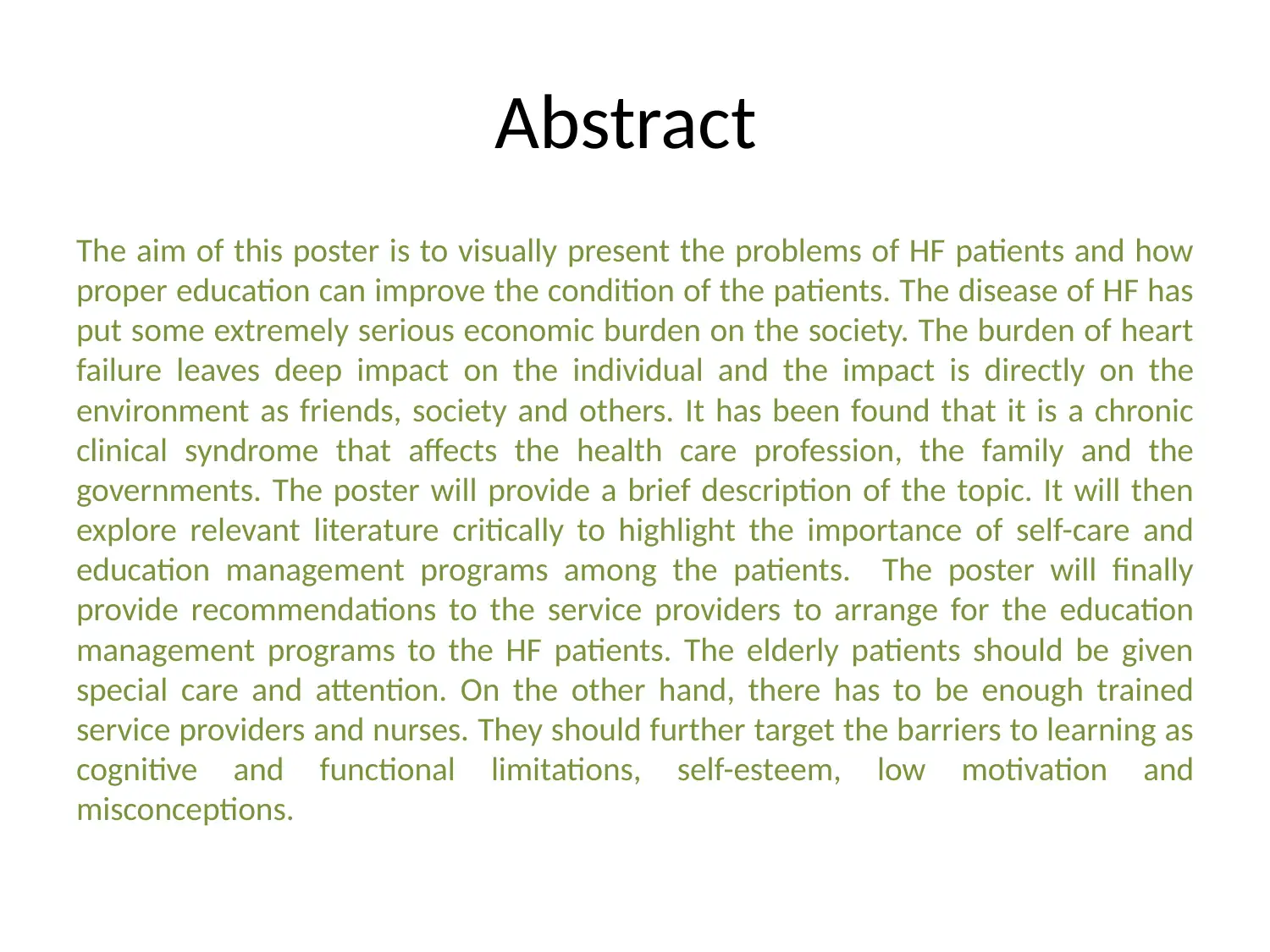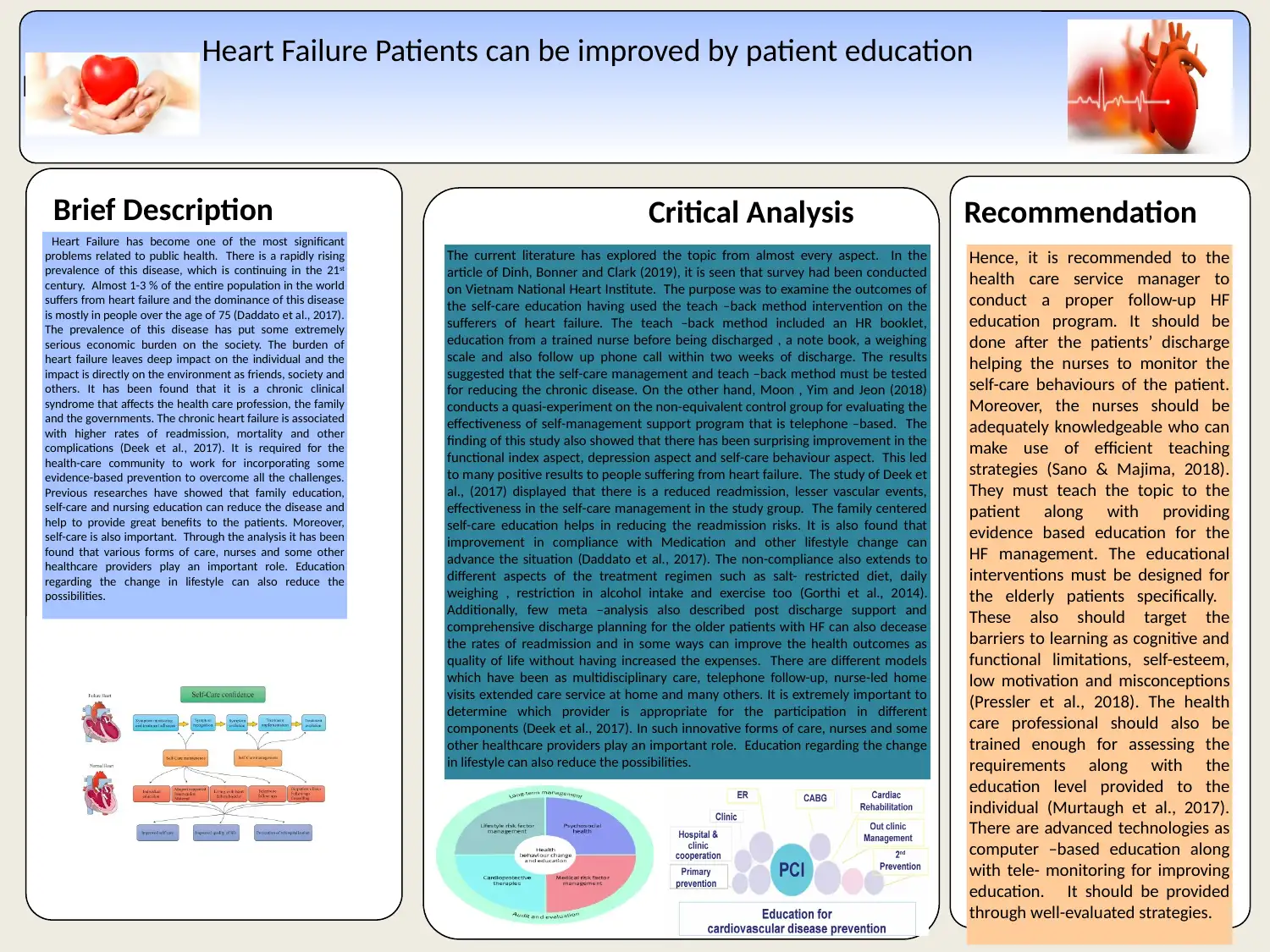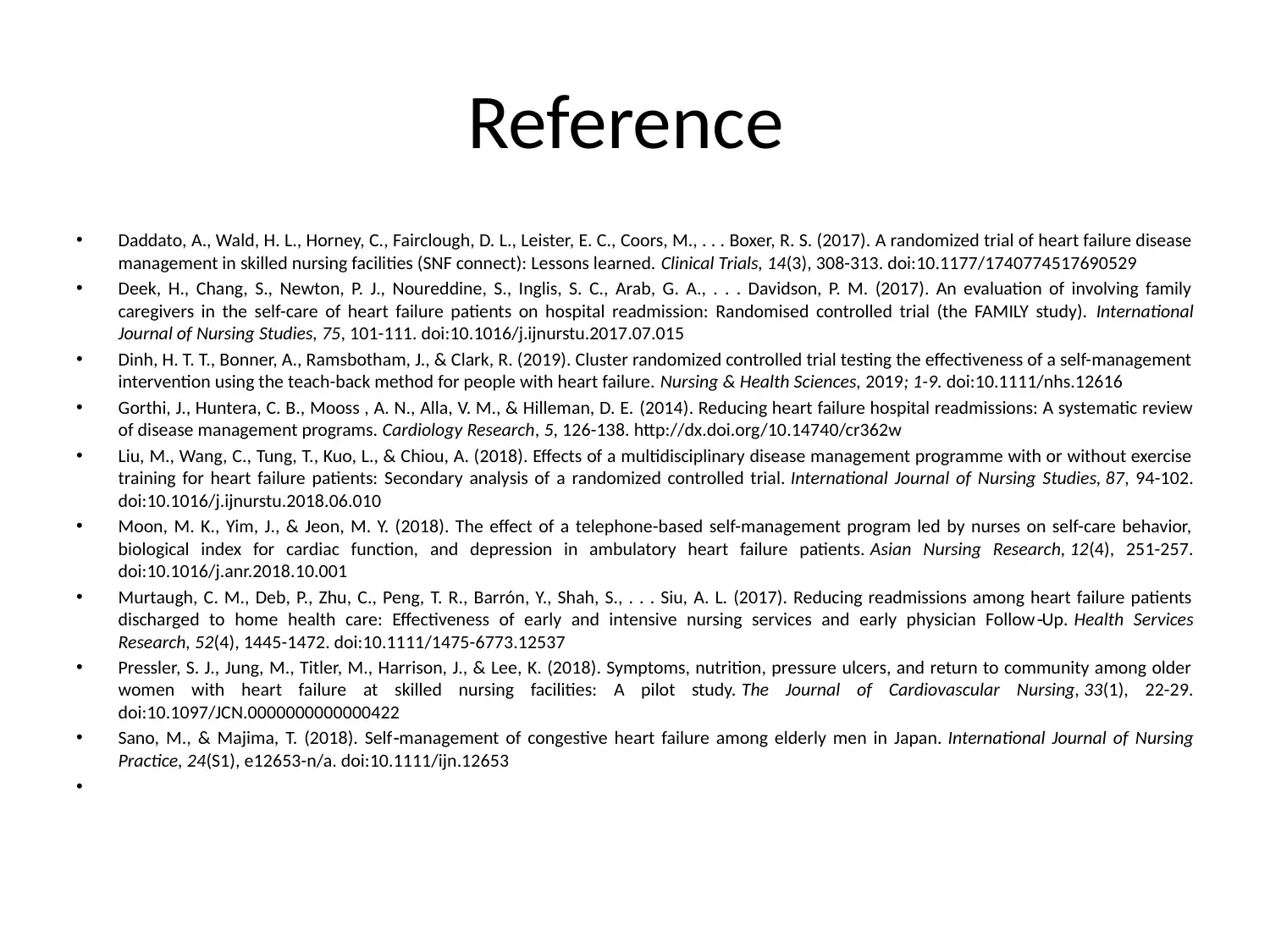1203NRS Trimester 2: Heart Failure Patient Education Poster
VerifiedAdded on 2022/10/19
|3
|1608
|11
Presentation
AI Summary
This poster presentation addresses the critical issue of heart failure (HF) and the potential for improved patient outcomes through effective education and self-care management. The poster begins by highlighting the significant economic and personal burdens associated with HF, emphasizing its impact on individuals, families, and healthcare systems. It then provides a concise overview of the topic, followed by a critical analysis of relevant literature, including studies that explore the effectiveness of self-care education programs and the teach-back method. The analysis incorporates research findings from various studies, such as the one conducted by Dinh, Bonner, and Clark (2019), to demonstrate the positive impact of education interventions. The poster also discusses the importance of addressing barriers to learning, such as cognitive and functional limitations, and offers recommendations for healthcare providers to implement targeted education programs, especially for elderly patients. The poster concludes by advocating for comprehensive HF education programs, emphasizing the need for trained service providers, nurses, and the use of advanced technologies to enhance the delivery of education, ultimately aiming to improve patient outcomes and reduce readmission rates. References include studies that support the importance of family-centered care, medication compliance, and lifestyle modifications in HF management.

Abstract
The aim of this poster is to visually present the problems of HF patients and how
proper education can improve the condition of the patients. The disease of HF has
put some extremely serious economic burden on the society. The burden of heart
failure leaves deep impact on the individual and the impact is directly on the
environment as friends, society and others. It has been found that it is a chronic
clinical syndrome that affects the health care profession, the family and the
governments. The poster will provide a brief description of the topic. It will then
explore relevant literature critically to highlight the importance of self-care and
education management programs among the patients. The poster will finally
provide recommendations to the service providers to arrange for the education
management programs to the HF patients. The elderly patients should be given
special care and attention. On the other hand, there has to be enough trained
service providers and nurses. They should further target the barriers to learning as
cognitive and functional limitations, self-esteem, low motivation and
misconceptions.
The aim of this poster is to visually present the problems of HF patients and how
proper education can improve the condition of the patients. The disease of HF has
put some extremely serious economic burden on the society. The burden of heart
failure leaves deep impact on the individual and the impact is directly on the
environment as friends, society and others. It has been found that it is a chronic
clinical syndrome that affects the health care profession, the family and the
governments. The poster will provide a brief description of the topic. It will then
explore relevant literature critically to highlight the importance of self-care and
education management programs among the patients. The poster will finally
provide recommendations to the service providers to arrange for the education
management programs to the HF patients. The elderly patients should be given
special care and attention. On the other hand, there has to be enough trained
service providers and nurses. They should further target the barriers to learning as
cognitive and functional limitations, self-esteem, low motivation and
misconceptions.
Paraphrase This Document
Need a fresh take? Get an instant paraphrase of this document with our AI Paraphraser

Brief Description Recommendation
Heart Failure Patients can be improved by patient education
Logo
Critical Analysis
Logo
Heart Failure has become one of the most significant
problems related to public health. There is a rapidly rising
prevalence of this disease, which is continuing in the 21st
century. Almost 1-3 % of the entire population in the world
suffers from heart failure and the dominance of this disease
is mostly in people over the age of 75 (Daddato et al., 2017).
The prevalence of this disease has put some extremely
serious economic burden on the society. The burden of
heart failure leaves deep impact on the individual and the
impact is directly on the environment as friends, society and
others. It has been found that it is a chronic clinical
syndrome that affects the health care profession, the family
and the governments. The chronic heart failure is associated
with higher rates of readmission, mortality and other
complications (Deek et al., 2017). It is required for the
health-care community to work for incorporating some
evidence-based prevention to overcome all the challenges.
Previous researches have showed that family education,
self-care and nursing education can reduce the disease and
help to provide great benefits to the patients. Moreover,
self-care is also important. Through the analysis it has been
found that various forms of care, nurses and some other
healthcare providers play an important role. Education
regarding the change in lifestyle can also reduce the
possibilities.
The current literature has explored the topic from almost every aspect. In the
article of Dinh, Bonner and Clark (2019), it is seen that survey had been conducted
on Vietnam National Heart Institute. The purpose was to examine the outcomes of
the self-care education having used the teach –back method intervention on the
sufferers of heart failure. The teach –back method included an HR booklet,
education from a trained nurse before being discharged , a note book, a weighing
scale and also follow up phone call within two weeks of discharge. The results
suggested that the self-care management and teach –back method must be tested
for reducing the chronic disease. On the other hand, Moon , Yim and Jeon (2018)
conducts a quasi-experiment on the non-equivalent control group for evaluating the
effectiveness of self-management support program that is telephone –based. The
finding of this study also showed that there has been surprising improvement in the
functional index aspect, depression aspect and self-care behaviour aspect. This led
to many positive results to people suffering from heart failure. The study of Deek et
al., (2017) displayed that there is a reduced readmission, lesser vascular events,
effectiveness in the self-care management in the study group. The family centered
self-care education helps in reducing the readmission risks. It is also found that
improvement in compliance with Medication and other lifestyle change can
advance the situation (Daddato et al., 2017). The non-compliance also extends to
different aspects of the treatment regimen such as salt- restricted diet, daily
weighing , restriction in alcohol intake and exercise too (Gorthi et al., 2014).
Additionally, few meta –analysis also described post discharge support and
comprehensive discharge planning for the older patients with HF can also decease
the rates of readmission and in some ways can improve the health outcomes as
quality of life without having increased the expenses. There are different models
which have been as multidisciplinary care, telephone follow-up, nurse-led home
visits extended care service at home and many others. It is extremely important to
determine which provider is appropriate for the participation in different
components (Deek et al., 2017). In such innovative forms of care, nurses and some
other healthcare providers play an important role. Education regarding the change
in lifestyle can also reduce the possibilities.
Hence, it is recommended to the
health care service manager to
conduct a proper follow-up HF
education program. It should be
done after the patients’ discharge
helping the nurses to monitor the
self-care behaviours of the patient.
Moreover, the nurses should be
adequately knowledgeable who can
make use of efficient teaching
strategies (Sano & Majima, 2018).
They must teach the topic to the
patient along with providing
evidence based education for the
HF management. The educational
interventions must be designed for
the elderly patients specifically.
These also should target the
barriers to learning as cognitive and
functional limitations, self-esteem,
low motivation and misconceptions
(Pressler et al., 2018). The health
care professional should also be
trained enough for assessing the
requirements along with the
education level provided to the
individual (Murtaugh et al., 2017).
There are advanced technologies as
computer –based education along
with tele- monitoring for improving
education. It should be provided
through well-evaluated strategies.
Heart Failure Patients can be improved by patient education
Logo
Critical Analysis
Logo
Heart Failure has become one of the most significant
problems related to public health. There is a rapidly rising
prevalence of this disease, which is continuing in the 21st
century. Almost 1-3 % of the entire population in the world
suffers from heart failure and the dominance of this disease
is mostly in people over the age of 75 (Daddato et al., 2017).
The prevalence of this disease has put some extremely
serious economic burden on the society. The burden of
heart failure leaves deep impact on the individual and the
impact is directly on the environment as friends, society and
others. It has been found that it is a chronic clinical
syndrome that affects the health care profession, the family
and the governments. The chronic heart failure is associated
with higher rates of readmission, mortality and other
complications (Deek et al., 2017). It is required for the
health-care community to work for incorporating some
evidence-based prevention to overcome all the challenges.
Previous researches have showed that family education,
self-care and nursing education can reduce the disease and
help to provide great benefits to the patients. Moreover,
self-care is also important. Through the analysis it has been
found that various forms of care, nurses and some other
healthcare providers play an important role. Education
regarding the change in lifestyle can also reduce the
possibilities.
The current literature has explored the topic from almost every aspect. In the
article of Dinh, Bonner and Clark (2019), it is seen that survey had been conducted
on Vietnam National Heart Institute. The purpose was to examine the outcomes of
the self-care education having used the teach –back method intervention on the
sufferers of heart failure. The teach –back method included an HR booklet,
education from a trained nurse before being discharged , a note book, a weighing
scale and also follow up phone call within two weeks of discharge. The results
suggested that the self-care management and teach –back method must be tested
for reducing the chronic disease. On the other hand, Moon , Yim and Jeon (2018)
conducts a quasi-experiment on the non-equivalent control group for evaluating the
effectiveness of self-management support program that is telephone –based. The
finding of this study also showed that there has been surprising improvement in the
functional index aspect, depression aspect and self-care behaviour aspect. This led
to many positive results to people suffering from heart failure. The study of Deek et
al., (2017) displayed that there is a reduced readmission, lesser vascular events,
effectiveness in the self-care management in the study group. The family centered
self-care education helps in reducing the readmission risks. It is also found that
improvement in compliance with Medication and other lifestyle change can
advance the situation (Daddato et al., 2017). The non-compliance also extends to
different aspects of the treatment regimen such as salt- restricted diet, daily
weighing , restriction in alcohol intake and exercise too (Gorthi et al., 2014).
Additionally, few meta –analysis also described post discharge support and
comprehensive discharge planning for the older patients with HF can also decease
the rates of readmission and in some ways can improve the health outcomes as
quality of life without having increased the expenses. There are different models
which have been as multidisciplinary care, telephone follow-up, nurse-led home
visits extended care service at home and many others. It is extremely important to
determine which provider is appropriate for the participation in different
components (Deek et al., 2017). In such innovative forms of care, nurses and some
other healthcare providers play an important role. Education regarding the change
in lifestyle can also reduce the possibilities.
Hence, it is recommended to the
health care service manager to
conduct a proper follow-up HF
education program. It should be
done after the patients’ discharge
helping the nurses to monitor the
self-care behaviours of the patient.
Moreover, the nurses should be
adequately knowledgeable who can
make use of efficient teaching
strategies (Sano & Majima, 2018).
They must teach the topic to the
patient along with providing
evidence based education for the
HF management. The educational
interventions must be designed for
the elderly patients specifically.
These also should target the
barriers to learning as cognitive and
functional limitations, self-esteem,
low motivation and misconceptions
(Pressler et al., 2018). The health
care professional should also be
trained enough for assessing the
requirements along with the
education level provided to the
individual (Murtaugh et al., 2017).
There are advanced technologies as
computer –based education along
with tele- monitoring for improving
education. It should be provided
through well-evaluated strategies.

Reference
• Daddato, A., Wald, H. L., Horney, C., Fairclough, D. L., Leister, E. C., Coors, M., . . . Boxer, R. S. (2017). A randomized trial of heart failure disease
management in skilled nursing facilities (SNF connect): Lessons learned. Clinical Trials, 14(3), 308-313. doi:10.1177/1740774517690529
• Deek, H., Chang, S., Newton, P. J., Noureddine, S., Inglis, S. C., Arab, G. A., . . . Davidson, P. M. (2017). An evaluation of involving family
caregivers in the self-care of heart failure patients on hospital readmission: Randomised controlled trial (the FAMILY study). International
Journal of Nursing Studies, 75, 101-111. doi:10.1016/j.ijnurstu.2017.07.015
• Dinh, H. T. T., Bonner, A., Ramsbotham, J., & Clark, R. (2019). Cluster randomized controlled trial testing the effectiveness of a self-management
intervention using the teach-back method for people with heart failure. Nursing & Health Sciences, 2019; 1-9. doi:10.1111/nhs.12616
• Gorthi, J., Huntera, C. B., Mooss , A. N., Alla, V. M., & Hilleman, D. E. (2014). Reducing heart failure hospital readmissions: A systematic review
of disease management programs. Cardiology Research, 5, 126-138. http://dx.doi.org/10.14740/cr362w
• Liu, M., Wang, C., Tung, T., Kuo, L., & Chiou, A. (2018). Effects of a multidisciplinary disease management programme with or without exercise
training for heart failure patients: Secondary analysis of a randomized controlled trial. International Journal of Nursing Studies, 87, 94-102.
doi:10.1016/j.ijnurstu.2018.06.010
• Moon, M. K., Yim, J., & Jeon, M. Y. (2018). The effect of a telephone-based self-management program led by nurses on self-care behavior,
biological index for cardiac function, and depression in ambulatory heart failure patients. Asian Nursing Research, 12(4), 251-257.
doi:10.1016/j.anr.2018.10.001
• Murtaugh, C. M., Deb, P., Zhu, C., Peng, T. R., Barrón, Y., Shah, S., . . . Siu, A. L. (2017). Reducing readmissions among heart failure patients
discharged to home health care: Effectiveness of early and intensive nursing services and early physician Follow Up.‐ Health Services
Research, 52(4), 1445-1472. doi:10.1111/1475-6773.12537
• Pressler, S. J., Jung, M., Titler, M., Harrison, J., & Lee, K. (2018). Symptoms, nutrition, pressure ulcers, and return to community among older
women with heart failure at skilled nursing facilities: A pilot study. The Journal of Cardiovascular Nursing, 33(1), 22-29.
doi:10.1097/JCN.0000000000000422
• Sano, M., & Majima, T. (2018). Self management of congestive heart failure among elderly men in Japan.‐ International Journal of Nursing
Practice, 24(S1), e12653-n/a. doi:10.1111/ijn.12653
•
• Daddato, A., Wald, H. L., Horney, C., Fairclough, D. L., Leister, E. C., Coors, M., . . . Boxer, R. S. (2017). A randomized trial of heart failure disease
management in skilled nursing facilities (SNF connect): Lessons learned. Clinical Trials, 14(3), 308-313. doi:10.1177/1740774517690529
• Deek, H., Chang, S., Newton, P. J., Noureddine, S., Inglis, S. C., Arab, G. A., . . . Davidson, P. M. (2017). An evaluation of involving family
caregivers in the self-care of heart failure patients on hospital readmission: Randomised controlled trial (the FAMILY study). International
Journal of Nursing Studies, 75, 101-111. doi:10.1016/j.ijnurstu.2017.07.015
• Dinh, H. T. T., Bonner, A., Ramsbotham, J., & Clark, R. (2019). Cluster randomized controlled trial testing the effectiveness of a self-management
intervention using the teach-back method for people with heart failure. Nursing & Health Sciences, 2019; 1-9. doi:10.1111/nhs.12616
• Gorthi, J., Huntera, C. B., Mooss , A. N., Alla, V. M., & Hilleman, D. E. (2014). Reducing heart failure hospital readmissions: A systematic review
of disease management programs. Cardiology Research, 5, 126-138. http://dx.doi.org/10.14740/cr362w
• Liu, M., Wang, C., Tung, T., Kuo, L., & Chiou, A. (2018). Effects of a multidisciplinary disease management programme with or without exercise
training for heart failure patients: Secondary analysis of a randomized controlled trial. International Journal of Nursing Studies, 87, 94-102.
doi:10.1016/j.ijnurstu.2018.06.010
• Moon, M. K., Yim, J., & Jeon, M. Y. (2018). The effect of a telephone-based self-management program led by nurses on self-care behavior,
biological index for cardiac function, and depression in ambulatory heart failure patients. Asian Nursing Research, 12(4), 251-257.
doi:10.1016/j.anr.2018.10.001
• Murtaugh, C. M., Deb, P., Zhu, C., Peng, T. R., Barrón, Y., Shah, S., . . . Siu, A. L. (2017). Reducing readmissions among heart failure patients
discharged to home health care: Effectiveness of early and intensive nursing services and early physician Follow Up.‐ Health Services
Research, 52(4), 1445-1472. doi:10.1111/1475-6773.12537
• Pressler, S. J., Jung, M., Titler, M., Harrison, J., & Lee, K. (2018). Symptoms, nutrition, pressure ulcers, and return to community among older
women with heart failure at skilled nursing facilities: A pilot study. The Journal of Cardiovascular Nursing, 33(1), 22-29.
doi:10.1097/JCN.0000000000000422
• Sano, M., & Majima, T. (2018). Self management of congestive heart failure among elderly men in Japan.‐ International Journal of Nursing
Practice, 24(S1), e12653-n/a. doi:10.1111/ijn.12653
•
⊘ This is a preview!⊘
Do you want full access?
Subscribe today to unlock all pages.

Trusted by 1+ million students worldwide
1 out of 3
Related Documents
Your All-in-One AI-Powered Toolkit for Academic Success.
+13062052269
info@desklib.com
Available 24*7 on WhatsApp / Email
![[object Object]](/_next/static/media/star-bottom.7253800d.svg)
Unlock your academic potential
Copyright © 2020–2026 A2Z Services. All Rights Reserved. Developed and managed by ZUCOL.





